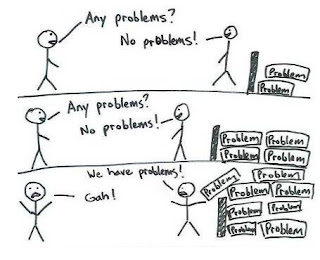Here are some questions to trigger people's thinking:
- Why does the person on the right (R) say there is no problem ?
- Why does the person on the left (L) accept his 'No problems!' answer ?
- Assuming that (L) is the manager, what does he do right ?
- What happens after the third image ? What culture and behavior are fostered ?
Here are some possible anwers:
- The wall hides (R)'s problems; (R) cannot see his problems. Maybe (R) has learned that it is better to hide problems because e.g. the messenger usually gets shot or gets instructions on what to do about ( i.e. get more work). Maybe (R) even built that wall for that purpose ?
- (L) has no way of verifying that there no problems, as the problems are not visible.
- (L) is at the gemba and inviting (R) to talk about his problems. ( Note: Consider asking "What are your problems?" instead of "Do you have any problems?" The first questions sets the expectation that there always are problems. )
- Everybody is firefighting everywhere, everyday. Consequently, there is less and less time to prevent problems by eliminating root-causes. The prevailing mindset becomes: "our hero's are the firefighters" instead of "our hero's are the fire prevention team".
Source of image : unknown - pls. inform me if you know the author.

Hi, Nice blog.
BeantwoordenVerwijderenLet me react to above 4 answers. For me it is clear that companies as well all western society (for eastern societies I don't know) are giving more credits (status, money etc) to firefighters then to the prevention squad! So what is needed to change this mindset. This means that we need to have a managament profile that includes not only the "normal" to be expected process management skills but as well the skill to get (not on all the details) into the content of the work to learn to see that walls are build to prevent the manager from seeing.
Looking forward to your reflection on this!
all the best
Marco van Katwijk
Marco, thank you for your question! I'll share my reflections on this topic in my next blog article.
BeantwoordenVerwijderen